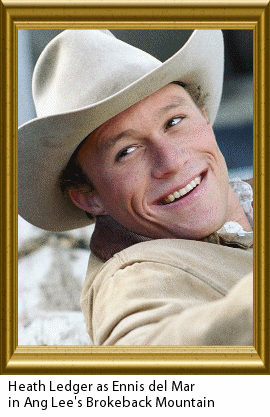The story is still breaking and the reasons or causes still unknown. I’m sure we’ll know more as the news media does it’s work of uncovering what can be uncovered.
My partner called me up to tell me the news. Feeling shocked I looked online while we talked to confirm what was true. Then I called Bo up and we talked about the loss. He told me the television stations in New York had broken in with the news.
Is this story right for a blog about Gay Wisdom?
Yes. I believe it is. Ledger wasn’t Gay but he was so successful in providing the film-watching world with one of the most nuanced, aching portrayals of a very real Gay man dealing with living openly and claiming his life — a portrayal we had never seen on the screen before on such a level. With that alone he may have singlehandedly (and with Jake Gyllenhall) provided a powerful service to the larger public about the realities of the homophobic, hetero-orthodoxy LGBT people live in day in and day out.
Beyond all the Brokeback jokes that flooded over us during the movie’s historic run and trophied success, there remained that simple story of these two men who found themselves in love, two men who struggled in a difficult period and place to carve out a loving space for themselves. This was the story that writer Annie Proulx had created to speak of the quiet lives of Gay ranchers she met while living in Wyoming. The critics raved:
"Both Mr. Ledger and Mr. Gyllenhaal make this anguished love story physically palpable. Mr. Ledger magically and mysteriously disappears beneath the skin of his lean, sinewy character. It is a screen performance, as good as the best of Marlon Brando and Sean Penn." the film, critic Stephen Holden
"Ledger’s magnificent performance is an acting miracle. He seems to tear it from his insides. Ledger doesn’t just know how Ennis moves, speaks and listens; he knows how he breathes. To see him inhale the scent of a shirt hanging in Jack’s closet is to take measure of the pain of love lost." the Rolling Stone’s, Peter Travers
In our 2006 White Crane interview with the writer Jeff Mann,:
I will remember Brokeback Mountain as one of the great films of my life. I don’t think any other mainstream movie has ever captured so many of my issues, my passions, and my fears. Most Gay [themed] films are about the urban experience, to which I can only partially relate. The fact that this film dealt with small town and rural experience really resonated with me, since I’ve spent most of my life in such settings. I thought the movie was beautifully filmed and finely acted, and I sympathized very strongly with both of the male protagonists.
Sure, one could look at Brokeback as yet another Hollywood Gay tragedy story, but I always felt it was an honest telling of a past (and for the majority of Gay people still trapped in less free places) and present reality we never see in the movies. And I can’t imagine a more heartwrenching portrayal of such an honest story.
I could go on and on about the portrayal but I think Andrew Hudson, who wrote a really amazing reflection on the movie for our 2006 Cowboy issue, nailed so much of the importance of the film and of Ledger’s amazing portrayal of Ennis.
A few excerpts then from Hudson’s writing:
One night in an upstate Wyoming bar, Annie Proulx noticed how a poor ranch hand in his late sixties looked with longing at the young cowboys playing pool. She wondered if he might be “country Gay,” and conceived “a story of destructive rural homophobia,” the tale of a love between two men shaped, forced by the mountain landscape’s “isolation and altitude,” by homophobic antipathy and denial. She rewrote her story over sixty times in the next months, as she got into a dialogue with her characters, determinedly hunted down the right words.
= = =
We end with the two shirts, but now Jack’s is enclosed inside Ennis’s, to say he lives on in Ennis’s heart. (This reversal was the brainchild of Heath Ledger, who to Annie Proulx “knew better than I did how Ennis felt and thought.”) As [the screenwriter] Larry McMurtry has said: when Ennis visits Jack’s parents, hears what Jack’s father says, finds the shirts in Jack’s room, it becomes a great movie, a tragedy — for he then realizes what he’s missed. We have seen his deep emotional turmoil, but he’s failed to grasp (what we have also seen): Jack’s enormous love for him (even during Jack’s unfaithfulness). We’ve heard Jack’s tender “it’s all right, it’s all right,” repeated in their second lovemaking; said in response to Ennis’s agony when he falls to his knees at the crux of their argument. We’ve felt Jack’s heart.
from Andrew Hudson’s "The Art of Brokeback Mountain", White Crane #68, Spring 2006.
